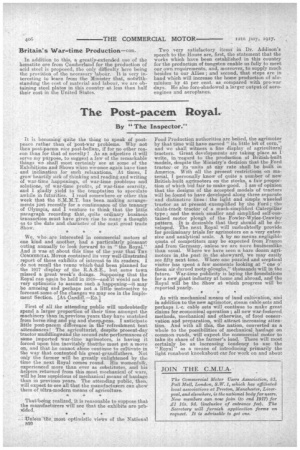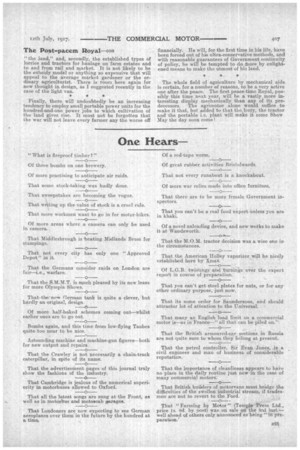The Post-pacem Royal.,
Page 2

Page 3

If you've noticed an error in this article please click here to report it so we can fix it.
By "The Inspector."
It is becoming q:uite the thing to speak of postpeace rather than of 'post-war problems. Why not then post-pacem vice post-bellum, if for no other reaeon than for that of novelty'? As an adjective it will . serve my purpoSe, to suggest a few of the remarkable things we shall most certainly see at some of the Exhibitions and Shows When we.once again have time and inclination for such eelaxations. At times, I grow heartily sick of thinking and reading and writing of war-time happenings, of war-time problems and solutions, of war-time profits, of war-time scarcity, and I gladly yield to the temptation to speculate awhile in futurities. I read somewhere or other this week that the S.M.M.T. has been making arrangements just recently for a. continuance of the tenancy of 0Iyinpia, and I venture to think that the little: paragraph recording that, quite ordinary business transaction must have given rise to many a thought as to the date and. ch.araeter of the next great trade Show: We, who-are interested in commercial motors of one kind and another, had a particularly pleasant outing annually to look forward to in. "the Royal." And it was at about this time of the year that TEE COMMERCIAL MOTOR contained its very well-illustrated :report of those exhibits of interest to its readers. I do not recall the Venue which had been planned for the 1017 display of the R.A.S.E., but some town missed a great week's doings. Supposing that the Royal can again be held in 1918—..ancrit would not be very optimistic to assume such a happening—it may be amusing and perhaps not a little instructive to. fOrecast.some of the changes we may see in the Implement Section. [AL Cardiff.—En.] First of all the attending public will undoubtedly spend a larger proportion of their time amongst the machinery than neprevious years they have snatched from horse ring and pig and sheepTens. I anticipate little postpacem difference in the refreshment tent attendances! The agriculturist, despite present-day tractor muddlingeandthe second-rate performances of some imported War-time agrimotors, is having it forced upon him inevitably thatthe must get a move on, and that he cannot alone continue to cultivate in the way that contented his great-grandfathers. Not only the farmer will be greatly enlightened by the time the next Royal comes round. His womenfolk, experienced more than ever as substitutes, and his helpers returned from this most mechanical of wars, will be less suspicious of mechanical means of haulage than in previous years. The attending public, then; will expect to see all that the manufacturers can show them of ultra-modern means of agriculture.
Thatheing realized, it is reasonable to suppose that the manufacturers will see that the exhibits are provided.
, .Unless the, most optimistic views of the National :920
Food Production authorities are belied, the agrimotor by that time will have earned "its little bit of corn," and we shall witness a fine display of agricultural tractors. Great developments are taking place as write: in 'regard to the production of British-built 'Models, despite the Ministry's decision that the Ford tractor or its -units at any rate shall be built in America. With all the present restrictions on material, I personally know of quite a number of new British-built agrimotors on the stocks I a fair propor tion of which bid fair to make good. am of opinion that the designs of the accepted models of tractors will be found to have developed along three separate and distinctive lines : the light and simple wheeled tractor as at present exemplified by the Ford; the chain-track tractor of a much-simplified Caterpillar type ; and the much smaller and simplified self-con-. tained meter plough of the Fowler-Wyles-Crawley pattern. It is desirable that they should all be developed. The next Royal will undoubtedly provide for preliminary trials for agrimotors on a, very extensive and analytical scale. A by no means negligible quota of competitors may be expected from France and from Germany, unless we are more businesslike than usual. Where we have seen a bare dozen agrimotors iii,the past in the ehowyard, we may easily see fifty next time. Where one puzzled and sceptical visitor has spent a few moments looking at "one o' them air darned moty-pioughs," thousands will in the future. War-time publicity is laying the foundations for a new giant industry at home and abroad, and the Royal will be the Show at which progress will be reported yearly.
As with mechanical means of land cultivation, and in addition to the new agrimotor, steam cable sets and perhaps i.-c. cable sets will continue to make great claims for economical. operation ; all new war-fostered methods, mechanical and otherwise, of food conservation and preparation, will attract increasing attention. And with all this, the nation, converted as a whole to the possibilities of mechanical haulage on common roads, will expect the commercial motor to take its share of the farmer's load. There will most certainly be an increasing tendency to use the "Royal" as a means of introducing, primarily the light runabout knockabout car for work on and about. the land," and, secondly, the established types of lorries and tractors for haulage on farm estates and to and from rail and market. lit is not likely to be the eulo.sirly model or anything so expensive that will appeal to the average market gareener or the ordinary agriculturist. There is room here again for new thought in design, as I suggested recently in the case of the light van.
Finally, there will undoubtedly he an increasing tendency to employ small portable power units for the hundred-and-one power jobs to which cultivation of the land gives rise. It must not be forgotten that the war will not leave every farmer any the worse off financially. He will, for the first time in his life, have been forced out of his ultra-conservative methods, and with reasonable guarantees of Government continuity of policy, he will be tempted to do More by enlightened means to make the utmost of his land.
• The whole field of agriculture by mechanical aids is certain, for a number of reasons, to be a very active one after the peace. The first peace-time Royal, possibly this time next year, will be a vastly more interesting display mechanically than any, of its predecessors. The agrirnotor alone would suffice to make it that, but added to that the lerr3r, the tractor and the portable i.e. plant will make it some Show May the day soon come






















